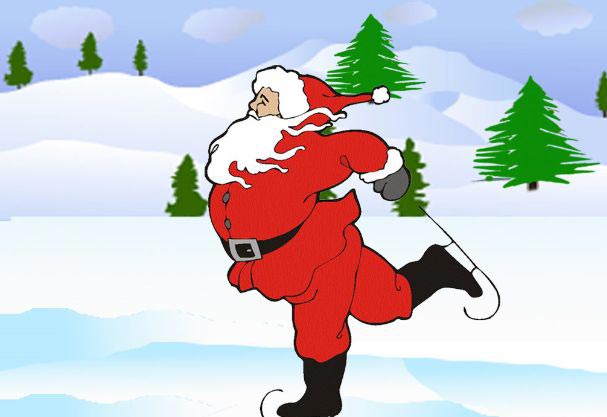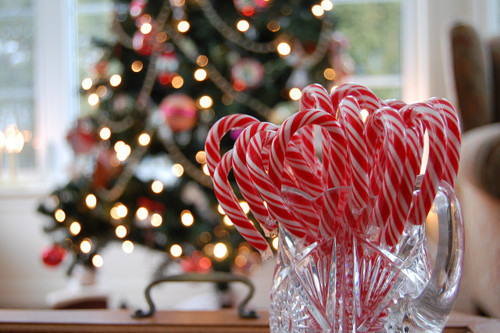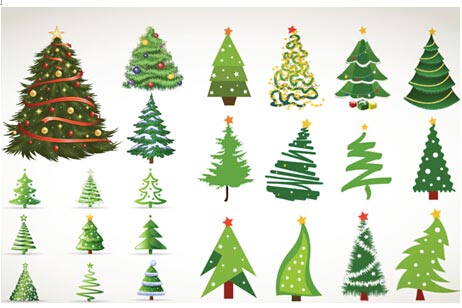|
装饰好圣诞树,挂好圣诞花环,现在该为圣诞老人准备好牛奶和饼干了。圣诞节的风俗习惯多种多样,但你想过这些习俗是怎么来的吗?现在为你揭晓答案。

Did Coca-Cola invent the modern-day Santa?
可口可乐公司创造了现代的圣诞老人形象? Nope, this one's a myth. Although Coca-Cola started using Santa in their advertising in the 1930s, the company didn't come up with the image of the plump old man in his signature red and white. It just so happened that Santa's red suit and white beard matched the brand's colors.
不,这只是一个误传。虽然可口可乐公司在上世纪30年代开始在广告中使用圣诞老人的形象,但身穿标志性红白相间服装的胖胖的圣诞老人的形象并不是该公司想出的,只不过碰巧圣诞老人的红衣服和白胡须颜色和可口可乐品牌外观设计颜色相同。 The modern-day image of Santa has been evolving for centuries. Modeled after Saint Nicholas who had a reputation for secret gift-giving, Santa was eventually shaped into the sleigh-riding, chimney-climbing man we know today, through the work of people like Washington Irving and illustrator Thomas Nast.
现代圣诞老人的形象几世纪以来不断演变。圣诞老人以喜欢匿名赠送礼物的圣•尼古拉斯(土耳其历史上真实存在的一位主教)为原型,经过作家华盛顿•欧文和漫画家托马斯•纳斯特的描绘,最终演变成如今这位乘雪橇、爬烟囱的老人形象。 Nast's 1881 "Merry Old Santa Claus" largely formed the basis for today's Santa. In that image, Santa appears in the classic red and white suit with a big belly to boot.
纳斯特1881年的作品《圣诞老人快乐》基本奠定了如今圣诞老人形象的基础。在这幅作品里,圣诞老人身穿经典的红白相间的衣服,还挺着大肚腩。

Where do candy canes come from?
拐杖糖是怎么来的? This is one of those traditions that we're not too sure about. One story goes that a German choirmaster in 1670 was worried about children being disruptive during long church services, so he went to a candy maker for sticks of white sugar to keep them quiet. To give the candy an educational slant, the choirmaster asked the candy maker to make the sticks in the shape of a cane so that the kids would remember the story of the shepherds who came to visit baby Jesus. However, all the references to this story are anecdotal and there are no real records to prove it's actually true.
这是一个我们不太确定来源的圣诞习俗。有说法认为,1670年德国一位唱诗班指挥担心孩子们在教堂礼拜时惹麻烦,因此让糖果制造商制作了白糖棒来安抚孩子。为了让糖果有教育意义,这位指挥让糖果制造商把糖棒制成拐杖状,以便让孩子们记住来看望小耶稣的“好牧人”的故事。但这只是一则趣闻轶事,没有真实的记载来证实。 What we do know is that in 1919, Bob McCormack started making candy canes in Georgia and eventually became one of the world's leading candy cane producers. Since manually shaping candy canes into their traditional 'J' shape was inefficient and labor-intensive, McCormack's brother-in-law, a Catholic priest named Gregory Keller, invented the Keller Machine to automate the process of shaping straight candy sticks into today's J-shaped candy canes.
我们明确知道的是,在1919年,美国乔治亚州的鲍勃•麦科马克开始制作拐杖糖,他所经营的公司最终成为全球最大的拐杖糖生产商之一。由于人工把拐杖糖打造成传统的J型费时费力,麦科马克的妹夫、天主教牧师格雷戈里•凯勒发明了凯勒机器,能够将直糖果棒自动变成弯曲的拐杖糖。

Why do we drink eggnog?
为什么圣诞喝蛋酒? Most culinary historians agree that eggnog stems from a medieval British drink called "posset," a thick, boozy, ale-like concoction seasoned with whatever spices were on hand. As the milk, eggs and sherry used to make posset were foods of the rich, the drink was used in toasts to prosperity and good health.
大多数美食历史学家都认为蛋酒来自英国中世纪一种名为“牛奶甜酒”的饮品,这种甜酒味道醇厚,酒香浓郁,是一种类似于麦芽酒的调制饮品,可以按自己的需求添加多种调味料。用于制作牛奶甜酒的牛奶、鸡蛋和雪利酒在当时只有有钱人才买得起,因此牛奶甜酒用来祝愿人们富足健康。 Eggnog became a holiday tradition when it was brought over to the American colonies, where cows, chickens and rum were much more accessible. As for the name? The term "nog" referred to a certain type of strong, English beer, while a "noggin" was a small cup intended for brewing nog.
蛋酒被带到美洲殖民地之后,成为一种假日习俗。在美洲,奶牛、鸡和朗姆酒更加普遍。至于名字?“nog”指的是一种强劲的英国啤酒,而“noggin”指的是用于酿造nog的小杯子。

Why do we put up Christmas trees?
为什么要搭圣诞树? There are a few different stories behind the origin of the modern-day Christmas tree, although not all are rooted in fact. Evergreen trees were actually used by pagans in winter festivals for thousands of years. During the winter solstice, evergreens signified the coming of spring. As Christianity spread throughout Europe, the trees began to be used as a symbol for Christmas. In mystery plays in Germany, they were often used as props, garnished with apples to represent the Garden of Eden.
现今圣诞树的起源有多个版本,但并非都有事实依据。其实异教徒在冬季的节日中使用常青树已经有几千年历史了。在冬至,常青树象征着春季的来临。由于基督教传遍欧洲,常青树开始象征圣诞节。在德国的神秘剧中,常青树经常用作小道具,装饰着代表伊甸园的苹果。 One legend credits 16th century Protestant reformer Martin Luther for bringing the Christmas tree into homes. Luther was supposedly walking through the forest on the night before Christmas when he looked up to see stars shining through the tree branches. He was so dazzled by the sight that he told his children it reminded him of Jesus and then erected a tree in his own home.
有传说认为,16世纪的新教改革者马丁•路德把圣诞树传统带入众多家庭。据说圣诞节前夜他穿过森林,抬头看见星光穿过树枝。他被这一美景震撼,告诉孩子们这让他想起了耶稣,于是在自己家搭了一棵圣诞树。 But it wasn't until the mid-19th century that the Christmas tree as we now know it became custom. England's Queen Victoria encouraged her husband Prince Albert to decorate a tree as he had back at home in what is now Germany. When a drawing of the royal family with their exquisite Christmas tree appeared in a London newspaper, the tradition became popular throughout the UK and US.
但直到19世纪中期,搭圣诞树才成为一种习俗。英国维多利亚女王鼓励丈夫阿尔伯特按照他原来家中(今德国境内)的样子装饰了一棵圣诞树。一家伦敦报纸刊登了英国王室与装饰精美的圣诞树在一起的画像之后,这一习俗在英国和美国流行起来。

Why do we hang wreaths on our doors?
为什么在门上挂圣诞花环? In ancient Rome, people would exchange evergreen branches during New Year's celebrations to wish each other good health. The Romans eventually began bending these branches into a ring and displaying them on doorways, which symbolized both victory and eternal life.
在古罗马,人们在新年庆祝时交换常青树树枝,互祝健康。后来罗马人把树枝编成花环挂在门口,象征胜利和永生。 The wreath later became a Christian symbol for the body of Christ. In holly wreaths, the sharp, pointed leaves represented the crown of thorns worn by Jesus on the cross and the small, red berries symbolized drops of blood. Evergreen wreaths embodied eternal life. For some Christians, hanging a wreath in the doorway has been an invitation for Christ to enter one's home. But today, people mostly hang wreaths on their doors because they're festive, pretty and well, because it's tradition.
之后,花环成为基督教会的象征。冬青花环上的尖树叶代表耶稣临刑前佩戴的荆棘王冠,而小小的红浆果象征血滴。常青花环象征永生。对一些基督教徒来说,在门口挂花环意思是邀请基督登门造访。但如今,人们在门上挂花环大多是因为花环很喜庆很漂亮,因为这已经成为圣诞传统。
|  /3
/3 